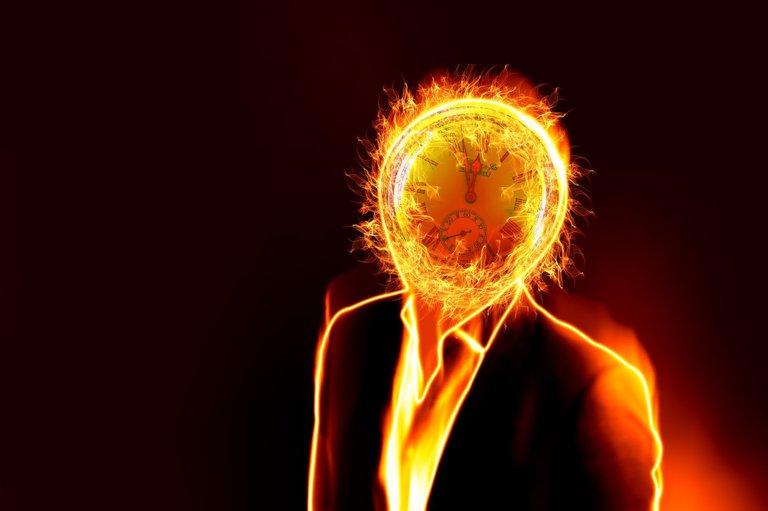I wrote in my last article about a theory of Eternal Inflation and Multiverse, writing that article and some little discussion that followed in the comments with Lemouth (Thank you!) sparked the idea of writing this one to explore an idea that is more inline with what I think could have been "before" the beginning of time.
What does it mean to lose track of "time" for the universe, and how crazy those initial conditions "before the Big Bang" are.
The Big Bang and the inflation theory seem to describe the beginning and explain how our universe began. Despite some of the issues that are still unexplained or not well understood, they manage to give an accurate model of our universe.
The story goes like this; the big bang happened some 13.8b years ago with some very rapid expansion of the universe from a very hot and dense state. Within a fraction of a second multiplying in size many orders of magnitude.
There's plenty of evidence that this is all correct and true. However, what exactly happened during those fractions of a second or right before that? No one knows, and no theory can explain that as all the laws and math break down at that "beginning" and we are not sure if that was even THE beginning, or just a beginning.

There's something almost paradoxical about the microwave background radiation, on one hand it's telling us that there was something like the Big Bang that happened. It's telling us that in the observations of the microwave background you can plot the intensity against each frequency and you find this wonderful curve, the Planck curve (black body spectrum), and it agrees with that to an extraordinary precision, better than what you could produce in a lab (the actual CMB data vs simulations).
On the other hand, it is telling us that the early universe must have been in what is called a thermal equilibrium.
Thermal equilibrium, however, by definition is the maximum random state! It is the state where the second law of thermodynamics tells us we are heading towards in the future. But yet, there it is in the past!!!
This is a very special state that has to have been there in the beginning, otherwise we don't have a second law. The second law of thermodynamics tells us things get more and more random, and that tells us that if we go backward in time, things get less and less random. So, it must have been very very special in that early state of the universe.
What we find in this microwave background is that matter and radiation were in an equilibrium, something missing in that picture is gravity. Because as we know, gravity tends to clump things together.
So the early universe was only special in that regard, somehow gravity wasn't thermalized with everything else.
And this is something no theory can explain, and perhaps will not be able to explain due to the second law of thermodynamics. (Things get more random as we go forward in time and less random if we go backwards, so how could it get more and more special in this early stage).

What happened before the big bang?
The usually conventional answer to that question is that the Big Bang was a singular state where all our equations go haywire, time and space don't make any sense and the question "before" doesn't mean anything.
It's a meaningless question. There is no "before" where there is no time!
Unsatisfactory answer, isn't it?
What are the other options? Well, this depends on how you characterize the initial state of the universe. Gravity seems to be special, and everything else was as random as it could be.
If you think in a conformal geometric way about the content of the universe, forgetting the sizes and worrying only about the shapes. Stretching and squashing everything in there uniformly wouldn't change anything.
So, in theory you could stretch that universe uniformly to infinity or squash it back to a finite boundary, totally ignoring the sizes as those mean nothing, just the angles do. (For those who make graphics, I'm sure you can understand this with "Scalable Vector Graphics (SVG)", you could scale the image to any size you want, and it won't change anything)
So basically, if we can do this idea of stretching and squashing, we could extend to "before" the Big Bang. If we can accept it, then that's a way of characterizing the initial state of the universe. [1]

When the opposites become one!

In the very early universe, the temperature was so high, in other words, the energies of particles was so high that it didn't even matter what their masses were.
Mass is what you'd need if you want to build a clock. With two fundamental equations in physics that can be referred to here:
1- The Planck law, which tells you (E = hʋ) energy is proportional to frequency.
2- The famous Einstein equation (E = mc2) which tells you that energy is proportional to mass.
Putting those 2 together, you can clearly arrive at the fact that mass and frequency are basically the same thing.
That means, there's a clock (which is the frequency) that is a measure of mass. Now if you don't have any mass, or let's say where mass becomes irrelevant, you can't build a clock!
So, in the early universe, the universe didn't "know" how to keep time. It "lost track" of how fast things were going. And you could've easily gone "before" geometrically. [2]
The other side of this idea, is if you think about the future of our universe, where is it heading?
The universe is expanding, and most importantly it's accelerating in this expansion. And in the very far future, eventually, all the matter in the universe will decay and everything will completely disappear apart from radiation. All blackholes would eventually evaporate and nothing would be left but radiation that is dispersed.
An extremely boring future if you think about it, but who would be there to "get bored"? Certainly not us! Everything that would be around then would be these "photons", and it's pretty hard to bore a photon. It doesn't experience any passage of time, not even eternity is a big deal to a photon, it just "whoop" there it is!
What's important about this picture, is that in a future where there's no mass left, the universe would have no way anymore to keep time (as mentioned earlier about the relation between mass and time).
With no mass left, distance becomes irrelevant, and time becomes irrelevant. With no time, the universe "forgets" how big it is. And what we talked about earlier in the idea of geometrical conformity (the stretching and squashing makes no difference) can be applied.
Now that the universe has "forgotten" how big or small it is, then it might as well be a small "new universe" in that way.
From an inflationary point of view, this idea fits. As we know the expansion is increasing exponentially and we will get to the point where that "rapid expansion" which took place in the past, will actually be happening in the "future". At a point where the universe "forgets" how big it is, we get a Big Bang for a new universe.
As more and more advances are made with the detection of gravitational waves background, we might find evidence in the future to support or disprove this idea. As such waves disturbances might have been carried over from collisions of blackholes in previous universes or "aeons" as Sir Roger Penrose calls it. [3]

● Thank you for reading ●
● •

© 2022 @yaziris.
